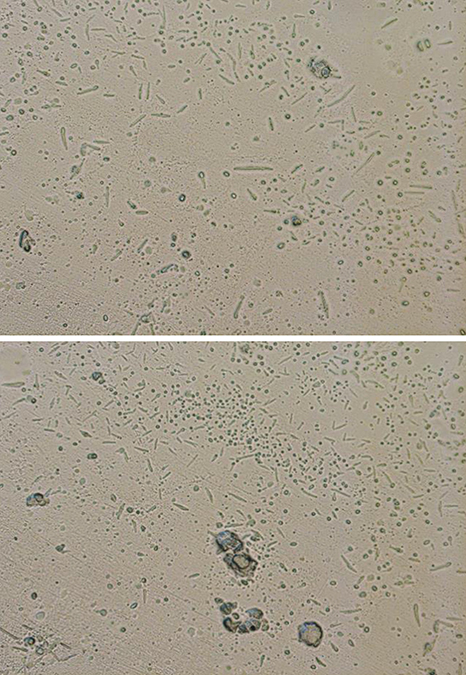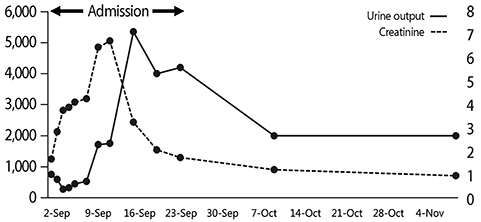Electrolyte Blood Press.
2017 Dec;15(2):47-51. 10.5049/EBP.2017.15.2.47.
A Case of Ethylene Glycol intoxication with Acute Renal Injury: Successful Recovery by Fomepizole and Renal Replacement Therapy
- Affiliations
-
- 1Department of Internal Medicine, Chungnam National University College of Medicine, Daejeon, Korea. daenii@cnu.ac.kr
- KMID: 2401153
- DOI: http://doi.org/10.5049/EBP.2017.15.2.47
Abstract
- Ethylene glycol is a widely used and readily available substance. Ethylene glycol ingestion does not cause direct toxicity; however, its metabolites are highly toxic and can be fatal even in trace amounts. Poisoning is best diagnosed through inquiry, but as an impaired state of consciousness is observed in most cases, poisoning must be suspected when a significantly elevated osmolar gap or high anion gap metabolic acidosis is found in blood tests. Hemodialysis and alcohol dehydrogenase inhibitors such as ethanol and fomepizole are a part of the basic treatment, and timely diagnosis and treatment are crucial because any delays can lead to death. However, there are few reported cases in Korea, and no report on the use of fomepizole. Herein, we report a case of acute renal failure caused by ethylene glycol poisoning that was treated with fomepizole and hemodialysis and present a literature review.
Keyword
MeSH Terms
Figure
Reference
-
1. Elms A. Goldfrank's toxicologic emergencies. Acad Emerg Med. 2011; 18.
Article2. Cox RD, Phillips WJ. Ethylene glycol toxicity. Mil Med. 2004; 169:660–663.
Article3. Fraser AD. Clinical toxicologic implications of ethylene glycol and glycolic acid poisoning. Ther Drug Monit. 2002; 24:232–238.
Article4. Jammalamadaka D, Raissi S. Ethylene glycol, methanol and isopropyl alcohol intoxication. Am J Med Sci. 2010; 339:276–281.
Article5. Peterson CD, Collins AJ, Himes JM, Bullock ML, Keane WF. Ethylene glycol poisoning: pharmacokinetics during therapy with ethanol and hemodialysis. New Engl J Med. 1981; 304:21–23.6. Gardner TB, Manning HL, Beelen AP, Cimis RJ, Cates JM, Lewis LD. Ethylene glycol toxicity associated with ischemia, perforation, and colonic oxalate crystal deposition. J Clin Gastroenterol. 2004; 38:435–439.
Article7. Barceloux DG, Bond GR, Krenzelok EP, Cooper H, Vale JA. American Academy of Clinical Toxicology practice guidelines on the treatment of methanol poisoning. J Toxicol Clin Toxicol. 2002; 40:415–446.
Article8. Bae JO, Kang SG, Lim SM, et al. A Case of Ethylene Glycol Poisoning with Metabolic Acidosis Treated with Hemodialysis. Kidney Res Clin Pract. 2005; 24:1039–1043.9. Rahman SS, Kadakia S, Balsam L, Rubinstein S. Autonomic Dysfunction as a Delayed Sequelae of Acute Ethylene Glycol Ingestion. J Med Toxicol. 2012; 8:124–129.
Article10. Min JH, Lee JY, Min MG, Chung SP, Kim SW, Yoo IS. Treatment of Ethylene Glycol Poisoning Patient Presented with Mental Change. J Korean Soc Clin Toxicol. 2004; 2:129–132.11. Porter WH. Ethylene glycol poisoning: quintessential clinical toxicology; analytical conundrum. Clin Chim Acta. 2012; 413:365–377.
Article12. Glaser DS. Utility of the serum osmol gap in the diagnosis of methanol or ethylene glycol ingestion. Ann Emerg Med. 1996; 27:343–346.
Article13. Meng QH, Adeli K, Zello GA, Porter WH, Krahn J. Elevated lactate in ethylene glycol poisoning: True or false. Clin Chim Acta. 2010; 411:601–604.
Article14. Hanouneh M, Chen TK. Calcium Oxalate Crystals in Ethylene Glycol Toxicity. New Engl J Med. 2017; 377:1467–1451.
Article15. Caravati EM, Erdman AR, Christianson G, et al. Ethylene glycol exposure: an evidence-based consensus guideline for out-of-hospital management. Clin Toxicol (Phila). 2005; 43:327–345.
Article16. Mégarbane B. Treatment of patients with ethylene glycol or methanol poisoning: focus on fomepizole. Open Access emergency medicine. Open Access Emerg Med. 2010; 2:67–75.17. Singh R, Arain E, Buth A, Kado J, Soubani A, Imran N. Ethylene glycol poisoning: an unusual cause of altered mental status and the lessons learned from management of the disease in the acute setting. Case Rep Crit Care. 2016.
Article
- Full Text Links
- Actions
-
Cited
- CITED
-
- Close
- Share
- Similar articles
-
- Recovery of Acute Renal Failure Secondaruy to Ethylene Glycol Intoxicity
- Acute renal failure and delayed neuropathy due to anti-freeze ingestion
- A Case of Uremic Pericarditis and Cardiac Tamponade That Developed after Ethylene Glycol Poisoning: A Case Report
- A Case of Acute Renal Failure, Acute Pancreatitis and Delayed Recovery of Bone Marrow Suppression, Accompanied with Ethylene Glycol Intoxication
- Fomepizole for Ethylene Glycol or Methanol Poisoning in Children



